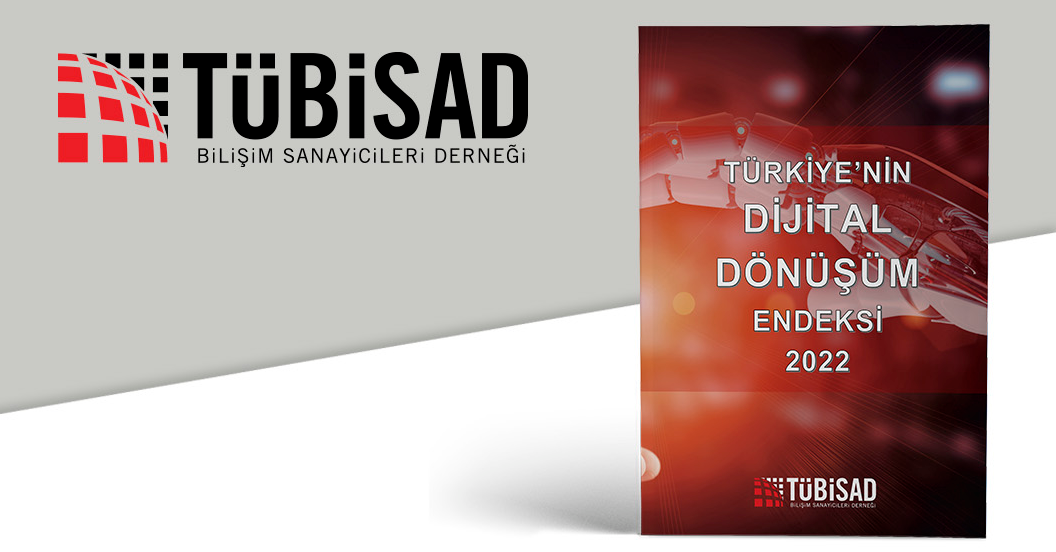Turkey's Digital Transformation Index 2022 Data Announced

Turkey's Digitalization Score Has Declined
According to the Turkey Digital Transformation Index 2022 Report prepared by the Informatics Industry Association (TÜBİSAD), Turkey's digitalization score has shown a decrease. In 2021, the score was 3.21, but in 2022, it was determined to be 3.12. The report assesses Turkey's digitalization performance in four main components and ten different dimensions, including ecosystem, competency, usage, and transformation. The report also provides insights into what needs to be done to accelerate Turkey's digital transformation.
The Informatics Industry Association (TÜBİSAD) has released the Turkey Digital Transformation Index 2022 Report to the public. This annual report examines the state of digitalization in the Turkish economy and society. It is created by analyzing surveys filled out by business professionals and data gathered from 139 countries. The report assesses Turkey's digitalization performance in four main components: ecosystem, competency, usage, and transformation, covering ten different dimensions.

Turkey's digital transformation score is 3.12.
According to the Turkey Digital Transformation Index 2022 Report, Turkey's digital transformation index for 2022 was measured at 3.12 on a scale of 5, showing a decrease of 2.8% compared to the previous year. Out of the 64 sub-indicators that make up the overall index value, 35 declined in 2022, 23 indicators increased, and 6 indicators remained unchanged.

"We need to strengthen our national vision for ICT (Information and Communication Technologies)."
TÜBİSAD Chairman of the Board Levent Kızıltan stated that the Turkey Digital Transformation Index Report is a useful tool for all organizations aiming to embrace digital transformation. He said, "Turkey's Digital Transformation Index covers legislation, infrastructure, usage, and skills that impact digital transformation, as well as the economic and social dimensions of transformation. It is a composite index that includes 64 different indicators, four main components, and 10 sub-dimensions. A relative index value is calculated for each indicator, sub-dimension, and main component using data from 139 countries. Therefore, the index value for any indicator is determined not only by Turkey's digitalization performance but also by its relative position compared to other countries. Taking into account the ambitious goals set by the European Union for the '2030 Digital Decade,' and considering our country's potential and objectives, it is essential to strengthen our national vision for information and communication technologies, accelerate infrastructure investments, and develop the entrepreneurial ecosystem and a qualified labor force."

The report highlights the following key findings:
- In 2022, the index scores for the components that make up the index, namely Ecosystem, Competency, Usage, and Transformation, showed a decrease. While in 2021, the most significant component affecting Turkey's digitalization score was the "Ecosystem" component, in 2022, it was the "Transformation" component. The "Competency" component had the most positive impact on Turkey's digitalization score in 2022, and the second most positive impact was from the "Usage" component.
- The index data shows that Turkey has the capacity for digital transformation and has made progress since 2019. However, as of 2022, digital transformation has relatively stagnated.
- The observed decline in 2022 may have two possible reasons: first, the macroeconomic instability and deterioration of the investment environment that Turkey's economy has faced for over a year; second, while digital transformation has been accelerating globally, it may have slowed down in Turkey.
- In this year's report, an additional survey was conducted with top executives from leading companies in the ICT sector to evaluate the impact of macroeconomic developments on the ICT sector. The survey also included questions about how permanent the acceleration of digital transformation during the COVID-19 pandemic has been. The findings indicate that macroeconomic instability and the deterioration of the investment environment have hindered Turkey's digital transformation.
- The increase in the exchange rate led to a decrease in sales, investments, imports, employment, profitability, and productivity. While the depreciation of the Turkish Lira boosted exports, it did not provide the desired positive contribution to the current account deficit, and imported goods and semi-finished products became increasingly costly in the domestic market.
- The main factor limiting the development of ICT in Turkey is the difficulty in sourcing a qualified labor force. While there was a previous trend of decreasing difficulties in this area, there was a surge in this issue in 2022.
- Access to financing issues, high tax burdens, and high costs of using ICT indicate the impact of the macroeconomic developments that dominated 2022.
- The COVID-19 pandemic had a significant accelerating effect on digitalization trends, and this effect has proven to be permanent.
Turkey’s Digitalization Index
The report provides recommendations for the future of digital transformation in Turkey:
Future Insights:
- Technologies that will have a significant impact on the sector include cloud computing, 5G and beyond connectivity technologies, artificial intelligence, big data, cybersecurity, and blockchain technologies.
- Data policies will be a crucial aspect of digital transformation policies.
- It is expected that there will be an increase in applications based on artificial intelligence, continued priority on investment in cloud computing, and a focus on areas such as cybersecurity and the modernization of existing systems.
- The exponential increase in data production will further emphasize the importance of cybersecurity and data privacy, with regulations implemented by countries.
- In 2023 and beyond, third-party risk assessments and risk management practices are expected to be at the forefront of companies' focus.
- In the near future, models and investments aimed at combating potential threats are expected to increase.
Human Resources – Brain Migration
- Companies in all sectors, regardless of the industry, need to implement strategies that will satisfy their competent personnel, especially strategies that prevent brain drain.
- To prevent brain drain and create better conditions for young people, there should be strategic collaboration between the public and private sectors.
- A governance model that guides digital economy strategies and policies should be established. In this model, the public sector should position itself as a supporter of the ecosystem rather than as a sector player.
SMEs - Digital Transformation:
- SMEs need to be informed about the requirements and processes of digital transformation.
- Support should be provided to SMEs to change their traditional ways of doing business and embrace digitalization.
- Necessary business models should be developed to enable SMEs to benefit from economies of scale.
- Addressing SMEs' challenges in accessing information and finance, as well as accelerating investments in 5G or fiber that will strengthen their position in the communication world, is crucial.